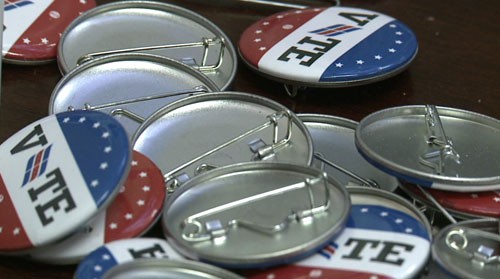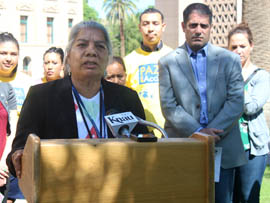Cronkite News has moved to a new home at cronkitenews.azpbs.org. Use this site to search archives from 2011 to May 2015. You can search the new site for current stories.
Groups: Poll shows opposition to proposed early voter list changes
PHOENIX – Fifty-nine percent of Arizona voters oppose legislation that would remove people from permanent early voting lists if they fail to vote via mail in two consecutive general elections, according to a poll commissioned by a group that advocates for Latino voters.
Arizona Working Families contends the survey shows public opinion is behind its opposition to a bill aimed at helping each county manage its permanent early voting list, often referred to as PEVL.
“Voters who are not on PEVL are far less likely to cast a ballot,” John Loredo, a former House minority leader who works with Arizona Working Families, said at a news conference Monday outside the Capitol.
Several voter-advocacy groups gathered to add the poll results to their case against SB 1261. The author, Sen. Michele Reagan, R-Scottsdale, said she worked with county election officials to find a way to reduce the number of provisional ballots cast by those registered to vote early.
The groups also oppose SB 1003, another Reagan bill that would prohibit third-party groups from gathering early ballots and dropping them off for voters.
Both bills have passed through the Senate and await a full hearing in the House.
“They’re moving forward with these bills that are really, really going to tie our hands; they’re going to shackle our hands,” said Petra Falcon, director of Promise Arizona.
Last year, Promise Arizona and its partners registered 34,000 new Latino voters in Maricopa County in 2012, Falcon said. Many such efforts sign voters up for permanent early voting lists.
“The PEVL is important because you can vote in the comfort of your home, you can discuss in private with family members or friends,” Falcon said.
Reagan, however, said the bills don’t target anyone and are solely intended to ensure votes are counted in a timely fashion.
“This has nothing to do with Latino groups,” she said. “Why would I not want more people to be registered?”
Reagan also questioned the legitimacy of the poll.
“It’s all the way you ask a question,” she said. “There are people who do this for a living. You can get any result you want.”
The automated telephone survey, conducted by Washington, D.C.-based Lake Research Partners, found that 59 percent of those surveyed among Arizona voters opposed SB 1621, while 33 percent were in favor and 7 percent weren’t sure. The survey, conducted earlier this month, involved a random sample of 600 Arizonans who voted in the November 2012 general election. The margin for error was plus or minus 4 percentage points.
The poll question said voters could be removed from a permanent early voting list if they fail to vote by mail for two consecutive elections. It listed dropping early ballots off at polling places as failing to vote by mail and as grounds for removal. It also said voters removed from the list could be temporarily unable to vote by mail.
Bruce Merrill, a senior research fellow at Arizona State University’s Morrison Institute for Public Policy, called Lake Research Partners a legitimate polling company and said the methodology was sound.
“That’s about what I would’ve expected, frankly,” he said of the results. “If somebody told me they were doing a survey on that subject, I would’ve thought 60 to 65 percent, somewhere in there, so I’m not at all surprised.”
However, Tammy Patrick, the Maricopa County Elections Department‘s federal-compliance officer, said the poll question incorrectly stated that voters could be removed from the permanent early voting list if they take their mail-in ballots to polling centers instead of voting by mail.
“A voter who votes a ballot mailed to them, whether they drop it at a polling place or put it in the mail, is still considered an early voter,” Patrick said.
She also contested the poll question’s claim that voters would be temporarily unable to vote by mail if removed from the list. Voters removed from the list would still be able to vote via mail in a single election by requesting a mail-in ballot, she said.
“I think that if this statement is what everyone believes the bill does, I can see where they might be upset,” Patrick said. “But this is not what the bill does.”









